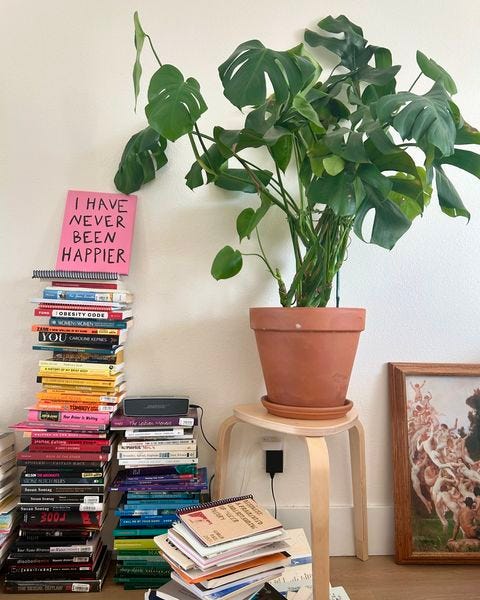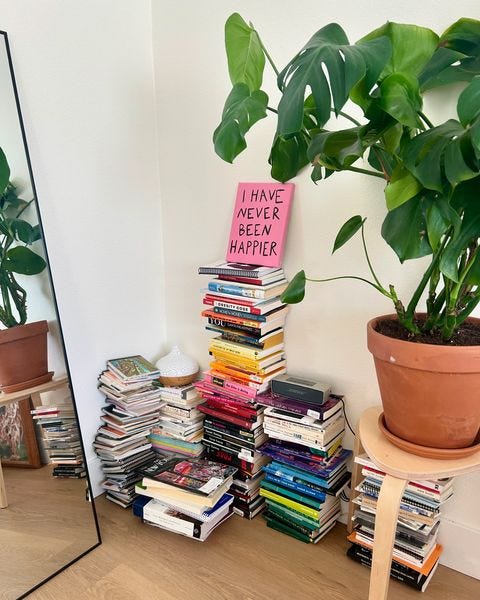Happy Wednesday!
Here’s what I have for you today:
Housekeeping
What I’m listening to
What I’m reading
Quotations
Tweets
& a disclaimer, again: Things are mostly terrible right now, and the violence is appalling, and there are many people out there who have addressed and do address it better than I ever could, so I’m not getting on a soapbox here—this will just be your weekly round-up featuring what I’ve been reading and thinking through, like usual.
Things to read:
Print and send postcards to demand freedom for Palestine and an end to arms sales
Israel kidnaps and tortures multiple journalists, including American Jeremy Loffredo
Housekeeping:
I have nothing else interesting to say this week. I’m just alive and keeping on, which, right now, feels like no minor miracle. Yeehaw.
Anyway, here are two photos of my books. I don’t have any shelves in LA.
What I’m listening to:
What I’m reading:
“Yo, Get Out My Room”: North West, in Conversation With Her Mom
13 Films Directed by Women and Non-Binary People to Watch This Halloween
Quotations:
I don’t think anybody ever knows what another person means when they speak, frankly. It’s more than translation, it’s just throwing yourself into the dark. Language is so very, very personal, private.
Sometimes, what I end up writing about is just the way the light is. And there seems to be some kind of contract that’s already in place between me and the light to say—in this notebook, which no one will ever read—what the light is like today, to get exactly the right words. I don’t know what that contract is. But it seems to underlie all the other writing.
Just think about something and follow it down to where it gets true.
What I am sure of is that we seek out ways to make time stop. That only happens in moments of total attention, which is why we pursue them.
Humor, like grief, like poetry, is occasionally a language of dissonance: dissimilar things side by side reflect back on each other some surprise or shared meaning.
Bereavement makes a mockery of borders and by extension narrative. It’s somewhat of a paradox, too, in that to engage with it is to engage with permanence — the foreverness of death, of grief — but also with what happens after death, whether those questions are spiritual or the practical problems of being the person who is still alive and tasked with the quotidian, like showering or deciding whether or not to stay alive. So it should be noted that grief is sometimes this, grappling with your own desire to die.
I resent the idea of grief as pathology — pathology negatively connoted as failure, as disease, rather than its valid classification as a mental and physical phenomenon that depresses the body’s processes, and lacks tidy parameters that might permit a person to, within a reasonable amount of time, Get Over It. I don’t believe in getting over it. I believe in weathering it badly, in nursing the grudge, and tending pathologically to the archive of people you have loved.
Gay men who cruise learn to navigate these environments with a high degree of social awareness and a cultivated unflappability. You shoot your shot, you get turned down, and sometimes the people who approach you might harbor some fetishistic interest. It’s all on the table, in the cruising space: we come together, we break apart, we watch, we get messy, and we float around the backroom like a fish in the tank, scanning for something we might never find. Many nights, we go home empty-handed. Other times, we’ve made memories that will accrue interest in our spank bank for a lifetime.
Beauty is a tool, the mask is a tool. Growing up watching the trajectory of, say, Hillary Clinton from headbands First Lady to the perma-smile while debating Trump has made me aware that masks create a space of both protection (from being judged for being too whatever — abrasive, loud, ugly) and transmission in the sense that the mask obscures a texture of a difficult message that makes it more palatable. It’s AOC’s Stila gloss in Beso, it’s certain news reporter’s uptalk, it’s what you wear so you can get into the mainstream in order to subvert it. The first mask I remember wearing is using the word “like” between every other word in high school English so I wouldn’t sound pretentious or unlikable when describing, like, Blanche DuBois’s trauma. My main character in MONARCH does the same thing — she uses vocal tics and appearance and affect to point away from her intelligence to both protect her and to allow her to be invisible enough to infiltrate systems she’d otherwise be excluded from.
I’ve been teaching in universities for a while and I notice that my end of semester evals are a hell of a lot better if I smile. Growing up in the ‘90s under the flat line of Daria’s mouth or Darleen Conner’s frown or Janeane Garafalo’s eye roll, I’ve never been a big smiler and I was opposed to the emotional labor of it for most of my teaching career. But I do it now because there’s such a direct connection between the smile → evaluations → economic reality. I compromise with myself by making a big point to tell students how often my appearance is commented in evaluations and to simply make them aware of this reality so they might take their bias about teacher’s affect into consideration more thoughtfully.
What bores me about beauty is definitely that it usually manifests as a lot of people looking the same, telegraphing the same thoughts and values, and just generally doing what’s already been done. There’s something really anti-future about our cultural idea of beauty.
I think beauty is boring because it’s a tool used to maintain stasis and control.
There’s a myth there that says after women moved into the workplace, they stopped doing as much home labor — but that’s not true! They just did more work all around.
Up until my late twenties, I dieted and exercised so much that when I started grad school I realized I was either going to have to choose between being too lightheaded and exhausted to think or I was going to have to choose to eat something, have natural texture in my hair, and bare nails in exchange for having the energy to learn about Marx and experimental poetry and subversion in 18th c. gothic novels. In short, it came down to: I only have so many resources, do I want to spend them being smart or feeling like I’m pretty enough?
The entire point of having a standard of physical beauty is to oppress not just those who don’t meet the standard, but to control those who do. So I think the warning we won’t heed is: there is no way to be physically beautiful without being compliant and controlled.
If you want to live a long time, there are things you can control within your lifetime such as diet, but really what you want is a very old grandmother.
While caloric restriction is generally good for lifespan, our data show that losing weight on caloric restriction is actually bad for lifespan. So when we look at human trials of longevity drugs and see that people are losing weight and have better metabolic profiles, it turns out that might not be a good marker of their future lifespan at all.
To wit: The study shows that it is just as possible that long-living mice are just more tolerant of limited calories, which may not even have anything to do with metabolism itself. This is basically saying, great news: If you have a hard time losing weight on caloric restriction, you may live longer more easily! Note that that is essentially the opposite of saying “everyone should diet and weigh less in order to lengthen their lifespan.”
Toward the end of her life, Weil was writing prayers in her notebooks: pleading with the Father to “rend this body … away from me … let nothing remain of me, forever, except this rending itself, or else nothingness.” In 1938, she spent ten days at Solesmes Abbey, a Benedictine monastery. She wanted to immerse herself in the liturgy; but, she later wrote, “I was suffering from splitting headaches; each sound hurt me like a blow.” By effort of will, she reports, she was able “to rise above this wretched flesh, to leave it to suffer by itself, heaped up in a corner, and to find a pure and perfect joy in the unimaginable beauty of the chanting and the words.” To be oriented toward the good, Weil thought, the soul must be unpicked from the body’s false demands. Weil’s insistent fasting, then, should be read as an attempt at discarnation. She didn’t want to understand the lives of the needy so much as she wanted to stand outside need altogether.
Like Weil, both Clein and Manne understand that food—which is, after all, something that we pluck from the world and envelop into ourselves—is intimately bound up with the human project of demarcating the “I.” Feminist analyses of disordered eating have long centered this insight. (Anorexia and bulimia are both more prevalent among girls and women than boys and men.) Many feminists have argued that an independent, bounded ego is the proper goal of human development, with the problem being that social conditions make female selfhood a fraught and elusive aspiration: girls are too closely identified with their bodies, and too attuned to the needs of others at the expense of their own.
Self-inflicted hunger is bad not because our bodily desires have so much moral weight, but, rather, because they have so little. When Simone Weil visited Solesmes Abbey, she wanted to find “a pure and perfect joy” in the Gregorian chanting, to stand outside her needy body. But can a really hungry person fully lose themselves in gorgeous music, or a mountainous vista, or the eyes of their beloved? I’ve never been able to manage it. The hungry person doesn’t unravel the “I.” Rather, their world contracts, collapses: there is nothing outside the hunger, no longer a not-self for the self to be stuck on to.
But is my body just for me? Can I separate out my own wants from others’ preferences? I want to be desired. I want to be needed. What those others need and desire, then, will always be threaded into what I need and desire. And if we insist upon drawing a line between us? Well, there’s no guarantee that “your own” needs and values will be kinder to you than others’. When I suffered from anorexia as an adolescent, it was my parents who wanted me to eat. I wanted to be thin, no matter what. “My” needs and values had not been displaced by impostors. There was nothing more authentically mine than my terror of eating. I had built my personality around it. Manne’s ideal of self-governance and self-authorship couldn’t save me, because—far from being anathema to my illness—they were its engine and its fuel. “Autonomy of the will,” wrote Kant, “is the property the will has of being a law unto itself.” Well, I was legislating for myself, and I was ecstatic.
Anorexia is readily conceptualized as an autonomy deficit. We like to imagine the anorexic as a hostage, seized by patriarchal culture, hijacked by unrealistic beauty ideals. You know the story.
It might seem dim-witted to ask why women and girls succumb to anorexia. Anorexic women dread eating. We assume that the fear of food expresses a fear of fatness: women stop eating because they want to be thin. But why do they want to be thin? The desire for thinness is practically culturally mandatory—so readily intelligible that it’s almost a joke to ask why. But anorexics, of course, become too thin. They go beyond—indeed, they almost seem to parody—our aesthetic ideals. The idea that thinness is self-evidently desirable—and that anorexia is its rational pursuit gone too far—masks anorexia’s true psychodynamics. It makes the anorexic comprehensible, but perverse. The anorexic is superficial, narcissistic and vain; the anorexic girl wants, too badly, to be hot, but ends up ugly. So we warn her that her hair will fall out, that she will be grotesque: covered in lanugo like a newborn. We say: this is not a path to beauty. The warnings, though, don’t seem to work.
Thinness felt to me then, and for many years thereafter, like a kind of safety. I had a keen, inarticulate sense that there was something pathetic and repulsive in my desires—desires that were, at that stage, still childish; I wanted friends, not boyfriends, but I wanted them with all the desperation and intensity of lust. Other girls my own age had started to slide, more easily than me, into adolescent femininity—a world with a brocade of rules so rich that I could never keep track of them. I was always tripping, stumbling, trying to keep up and failing.
Like many tomboyish girls, I experienced my adolescence as a kind of crisis. Gender had never really impressed itself upon me before; then, suddenly, I was caged by it.
My problem was that I wanted to hive myself off from others, to seal and store myself off and up, safe and fierce and proud in a cell. Like Simone Weil, I wanted to stand outside need.
Isolation may be partly self-imposed, a crucial stratagem in the project of control.
Anorexia is a will to power, twisted into a pretense at its absence. This pretense, perhaps—the anorexic mimics feminine diffidence—is part of why we find it so hard to recognize that anorexia is not an autonomy deficit, but rather a peculiarly uncompromising articulation of the desire to self-legislate.
Many women with eating disorders, Clein notes, cycle through a range of diagnoses: anorexia, bulimia, binge-eating disorder (BED), eating disorder not otherwise specified (EDNOS). When she was first diagnosed with EDNOS, Clein writes, it felt like a “fucking dare”: being placed at the bottom of the diagnostic hierarchy just made her want to climb it. Anorexia has a cachet—a glamour, even—that binge-and-purge disorders do not. When Clein was still suffering from eating disorders, she found it easy to tell her friends about blacking out from hunger, or obsessively counting her steps. She never told them about the laxatives she kept in her jewelry box. “Eating disorders,” Clein concludes, “are notoriously competitive diseases, and the existing diagnostic hierarchy inspires shame.”
The unhappy truth is that sometimes people with no agential defects will choose things that harm them. We can try to escape the hard choice between complicity on the one hand and paternalistic interference on the other by “finding” agential flaws where there are none. To read the anorexic as autonomous, then, need not mean that we stop trying to get her to eat. The anorexic governs and authors herself more fully than her peers. That doesn’t show that we should admire her discipline. It shows that we should be warier of self-governance as an ideal.
Just as Bach’s cello suites need cellos and cellists, I need my students and my husband, philosophy talks and my brother. I am something they create. My anorexia was a refusal of this dependence: an attempt to create a self that could float free from her social context, as an airy self-contained substance.





